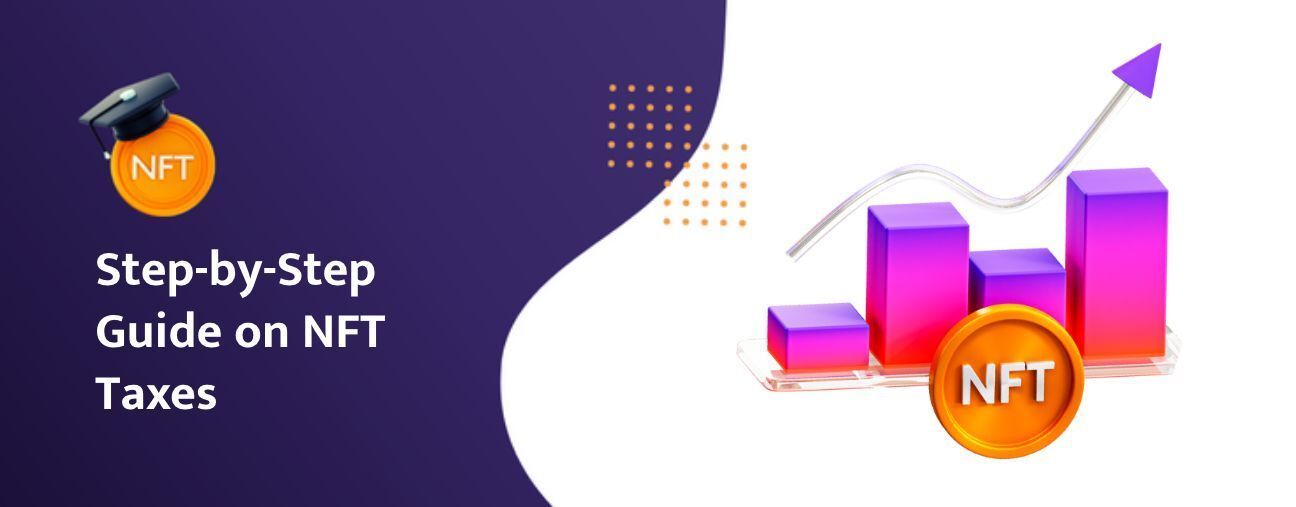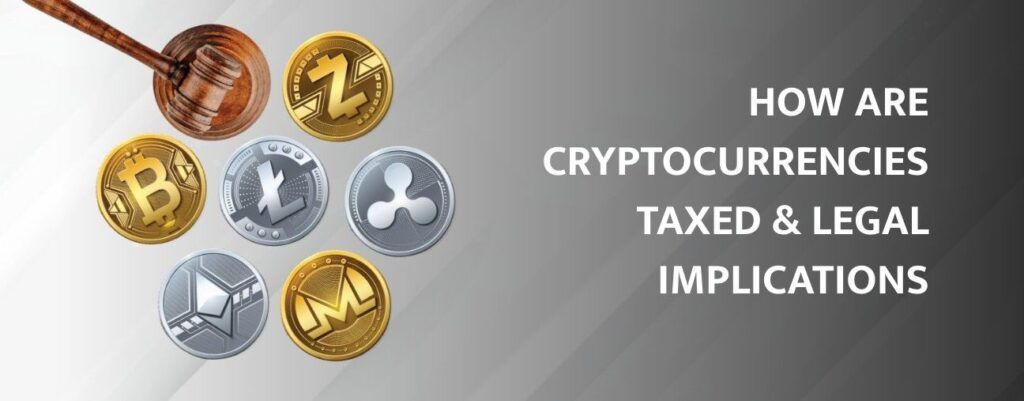Summary: The Tax Day deadline and process may be confusing, especially if you’re reporting gains from NFTs. It does not imply, however, that you ignore it. There’s a wealth of information on how to report NFT assets, gains, and losses. Mistakes in reporting taxes may have costly consequences; however, we have the answers to some of the questions you may have regarding taxes on NFTs.
Introduction
NFTs took the world by storm in 2022, thanks to widespread global adoption and all-time bitcoin highs in 2020, when “NFT” became the standard crypto buzzword. Collins Dictionary made it official when it added the term to its list of words. More than 1.5 million individuals own NFTs with a value of more than $12 billion.
That said, some traders are making money, while NFT creators are earning money from their virtual designs. However, the IRS has yet to provide clear direction on several issues surrounding taxes, adding to the uncertainty in this quickly developing market. So, what should you know before filling out your NFT tax forms?
Before we jump into understanding how NFTs are taxed and what to look out for, let’s first get you acquainted with NFTs.
What are NFTs?
NFTs are non-fungible tokens, which means each one is unique and not interchangeable with any other token. This is in contrast to cryptocurrency, which is fungible, meaning each unit is worth the same as any other unit of the same cryptocurrency. NFTs live on blockchains and can represent anything that can be digital, including art, music, video, collectibles, and in-game items.
NFTs have been around since the early days of cryptocurrency, but they gained broad attention in early 2021 when Beeple’s “Everydays: The First 5,000 Days” fetched $69.3 million at Sotheby’s, making it the third-most expensive artwork ever sold by a living artist.
Some NFTs are created using the ERC-721 Ethereum network standard, but they may also be produced on other blockchains like Bitcoin, Tron, Binance Smart Chain, and others.
Do you owe tax until the NFTs are sold?
You won’t have to pay tax until the NFT sells. It’s the same as if you’re a painter who creates something. They realize revenue on their painting when they sell it, but not before. You can deduct your expenses on the job, which is considered taxable income. This will be treated as ordinary income and taxed in the same manner as any other money received from employment.
Traders who sell an NFT for a profit will be taxed in the case of NFT trades. If they didn’t sell the NFT, they can keep their unrealized gains without paying taxes as long as they maintain ownership of it. However, the IRS has been vague on how traders should account for those profits.
There are two schools of thought among tax experts. The first is that NFTs should be taxed like capital gains. However, the more popular view is that they should be taxed like collectibles and have a different taxation system imposed on them.
Treating NFTs as capital gains results in capital gains taxes on net earnings. The silver lining is that if you’ve made a trade loss, it may be offset by any profit. In fact, you may deduct a maximum of $3,000 in yearly net capital losses from your taxable income. Depending on the income of a tax filer, this tax treatment is typically more beneficial for individuals than treatment as a collectible, where rates can reach up to 28 per cent.
Do you owe tax on income and royalties from NFTs?
Some NFTs include “smart contracts,” which pay the creator a fee each time the NFT is sold. For example, Person A may sell to Person B, who in six months sells it to Person C. The creator of an NFT may, depending on the type, realize a royalty of a few% or more on a second-hand sale by Person A, creating tax obligations for the creator.
However, depending on the cost basis and sale price of the NFT (see Point 1 above), as well as the value received for the cryptocurrency, that second-hand transaction may result in a taxable gain or loss for Person.
A new NFT type could represent an asset and generate money over time. If you receive cash from these sorts of NFTs, you’ll have to pay taxes at ordinary income tax rates, according to Rogers. It’s considered the same as other regular revenue.
So, how are NFTs really taxed?
Taxation of NFTs is unclear, but there are some key points to bear in mind.
First, NFTs are considered property for tax purposes, which means they are subject to capital gains taxes when sold. The tax rate on capital gains depends on your income bracket but can be as high as 37%.
If you hold an NFT for less than a year before selling it, your profits will be taxed at your ordinary income tax rate, which could be even higher than the capital gains tax rate.
Second, NFTs may also be subject to state and local taxes depending on where you live. For example, New York State recently released guidance stating that NFTs are subject to state and local sales tax.
Finally, it’s important to keep track of your NFT purchases and sales so that you can properly report them during tax time. The IRS has said that it will treat cryptocurrency as property for tax purposes, which means that every purchase and sale must be reported.You can either keep the manual records of your NFT transactions or can easily track your NFT taxes through CRPTM.
It’s critical to comprehend how the IRS regards NFTs in 2022. The US tax code, however, does not specify how NFTs should be taxed. However, there are certain principles that have allowed experts to roughly figure things out.
There’s a strong case to be made that NFTs shouldn’t be defined as “collectibles” under the United States tax code. But aren’t NFTs collectibles? So, why are they not taxed as such?
Collectibles under IRC Section 408(m)(2) are defined as follows:
- Any antique
- Any rug
- Any artwork
- Any gem /metal (limited to exceptions)
- Any coin /stamp (limited to exceptions)
- Any other personal property that is tangible that falls under “collectible” as pet the IRS under Section 408(m).
The phrase “other” in the last item on the list implies that collectibles must be tangible personal property. As a result, while NFTs might be art, they are not tangible. The jury is still out on this; however, it appears that NFTs are not taxed as collectibles.
On the whole, NFTs should be treated similarly to fungible cryptocurrencies like Bitcoin and Ether. When we take a step back, crypto is identical to stocks. It’s comparable to real estate in another way.
In a nutshell, the IRS considers NFTs to be property as well. What does this imply? Well, that capital gains taxes must be paid on them.
What are NFTs’ capital gains taxes?
A capital gain tax is a fee imposed on profits generated from the sale of an asset that has appreciated in value over time. That’s a mouthful, to say the least. When you make an NFT at 0.08 ETH and then sell it for 2.5 ETH several months later, you generate a taxable capital gain, according to this wording.
If you trade assets that are identical, the IRS views them as equivalent for tax purposes. This is especially true when it comes to losses. So if you bought an NFT for 2.5 ETH and subsequently sold it for a loss of 1.6 ETH, you have a capital loss.
When are capital gains taxes imposed? When are you required to pay them?
The public key of the receiver is employed by the sender to encrypt the message in a cryptocurrency transaction. The message is then sent over the internet. The receiver uses his/her own private key for decrypting the message. It all happens in a matter of seconds, and it’s very secure.
Most of your transactions may be taxed events, whether you’re selling an NFT, swapping one cryptocurrency for another (like ETH to BTC) or converting crypto into USD. When it comes time to settle up with the IRS, these earnings can result in a significant markup.
The IRS, on the other hand, takes a dim view of how long you’ve kept an NFT. But here’s the catch: How long you’ve had it in your possession makes a significant difference to the IRS.
Understanding Short-term and Long-term Capital Gains
If you hold an NFT for less than a year, and you sell it for more than you paid, you’ll have a short-term capital gain. These are taxed at the same level as your regular earnings.
According to the IRS’s established tax brackets for 2022, that will range from 10% to 37%.
If you have held an NFT for more than a year, you’ll have a long-term capital gain and should pay taxes at 0%, 15%, or 20% of the value, based on the value. For further information, see Form 8949 (in particular the “Sales and Other Dispositions of Capital Assets.”)
| 2022 Capital Gain Tax Rate Threshold | ||||
|---|---|---|---|---|
| Capital gain tax rate | Taxable income(Single) | Taxable income(Married filling separate) | Taxable income(Married filling jointly) | Taxable income(Head of household |
| 0% | Up to $46,675 | Up to $41,657 | Up to $83,350 | Up to $55,800 |
| 15% | $46,675-$459,750 | $41,657-$258,600 | $83,350-$517-200 | $55,800-$488-500 |
| 20% | over$459,750 | over$258,600 | over$517,200 | over$488,500 |
Calculating NFT Taxes
The circumstances of your NFT purchase are important to the IRS. You’ll need to consider things like the length of time you kept your crypto before purchasing an NFT, the price of your preferred coin when you bought it vs. when you purchased the NFT with it, how long you held the NFT, and so on (we’re hoping, this makes sense).
Check to see whether you acquired an NFT in USD rather than cryptocurrency. This is a non-taxable occurrence.
However, selling an NFT is always taxable. When NFTs are traded for USD, other cryptocurrencies, or used to acquire anything else, they are considered sold. And yes, this also includes pawning NFTs and dividing them up, as well as exchanging an NFT for another.
What is the impact of NFT tax on artists?
The material we’ve covered so far mostly pertains to NFT collectors. If you’re buying and selling NFTs, this data might be helpful in determining what kind of details you’ll need for taxes.
It is a bit different for NFT creators.
If you’re trading NFTs in addition to creating and selling them, you’ll need the above information. However, there is some extra data regarding the gains you’ve earned from the sale of your own work. Fortunately, all of it is rather simple from here on out.
It is not a taxable occurrence to create an NFT, but selling the associated NFT is. The usual approach for an NFT artist/creator is to pay taxes on profits when you sell an NFT. It’s a source of income. And you will be taxed at your regular income tax rate on this revenue. For self-employed persons, the marginal tax rate is 15.3 percent. If you’ve sold your work via a marketplace sale rather than a peer-to-peer payment, it would be considered income (just as selling a print of one of your works) and taxed accordingly.
Self-employment tax is a complicated topic, and there are several definitions floating around. It’s critical to understand that self-employment tax is distinct from your standard rate of 10% to 37%. You’ll need to figure out how much of your net earnings for the year are subject to self-employment tax.
Do note that any NFT that you acquired but did not create will be subject to the capital gains tax, as previously stated.
Filing Taxes on NFTs
Because the IRS has not yet provided direction on how to file taxes on NFTs, there are a few things to keep in mind.
- Be mindful in tracking all of your NFT purchases and sales. This includes the date of the transaction, the NFTs involved, and the amount of crypto or USD exchanged. If you don’t keep track of this information, it’ll be difficult to compute your taxes.
- Get an expert if you’re unsure. The IRS has not yet addressed how to file taxes for NFTs, making this a new area with no established standards. If you have concerns, meeting with a tax professional who can assist you in navigating the intricacies of your taxes is recommended.
- Be patient. The IRS has not yet released tax-filing guidance for NFTs, and it may take some time. In the meantime, keep track of your NFT purchases and sales so that you’re ready to submit your taxes once the guidance comes out.
When is it that you owe tax on NFTs?
The IRS has warned that any profits from trading in virtual currencies will be taxed. Virtual currencies are an electronic representation of value that serves as a medium of exchange, store of value, and/or unit of account, according to the 2014-21 IRS Notice.
Because crypto tokens are fungible and standardized, they are often considered securities by the IRS. While the IRS may not be able to trace individual tokens, exchanges must disclose overall activity. The agency has utilized this information to issue letters to crypto traders and investors urging them to pay their fair share of taxes.
Because non-fungible tokens are one-of-a-kind by nature, it’s significantly simpler to identify units sold—much like a bond’s CUSIP or a stock’s certificate number would. Depending on the NFT and the substance of the activity with the NFT, the tax on NFTs might be classified as regular income, capital gains, or tax-free.
Let’s assume you buy an NFT that represents a real estate asset. Because the token is simply a digital replica of a physical thing, it will be taxed as if it were a real-estate property rather than cryptos. If your revenue is lower than anticipated, you may be able to claim real-estate-related deductions in view of depreciation to offset it.
What transactions of NFTs are taxable?
Depending on how much the price of your crypto-assets has increased since you originally got them, the following activities are taxed as capital gains.

Using Cryptocurrency to Buy an NFT
- You purchase $400 worth of Ethereum
- Your Ethereum value increases to $600
- You sell your ETH for NFT
- You get capital gains of $200

Selling an NFT
- You purchase NFT for $800
- You then sell it for $600
- You incur a capital loss of $200

Trading NFT for Cryptocurrency or NFT
- You buy an NFT for $600
- You sell your NFT for another NFT worth $700
- You incur a capital gain of $100

In the interim, creator income from primary or secondary NFT sales is taxed as ordinary income.
- You are an Artist
- You sell the NFT of your latest artwork for $500
- You report ordinary income of $500
What transactions of NFT are non-taxable?
- Purchasing an NFT with fiat money
- Transferred NFTs from your one wallet to another.
- Donating NFT
What is the rate of tax on an NFT?
When you profit from an increase in cryptocurrency demand, it’s considered capital gains. This isn’t true when it comes to NFT transactions. This is due to the fact that NFTs are regarded as collectibles, therefore they will be taxed at a higher rate. In some rare cases, though, it may be treated as inventory stock and taxed at a higher rate.
Understanding Investor Taxes
The majority of those who come into contact with NFTs are investors. These are the individuals who trade and invest in public NFTs. For them, taxes operate in the same way as they do when trading cryptocurrencies.
Buying NFTs
It is taxed when you acquire NFTs using cryptocurrency.
For example;
- You purchased 2 ETHs for $600 each in April 2021 (a total of $1200).
- You used up the same amount of money to buy a Bored Ape NFT in Dec 2021, but the ETH is now worth $1200, which results in a capital gain of $1200 due to an increase in the value of your 2 ETHs.
Selling NFTs
The income generated by an NFT is taxed, and selling your NFT for crypto money, fiat currency, other NFTs, or even goods and services is a taxable activity.
For example;
- Let’s say you sell your NFT for $14,000 in six months. You would incur short-term capital gains of $12,800($14,000-$1,200).
- Short-term gains are taxed at normal income tax rates.
Understanding Creator Taxes
NFT creation is not taxed. According to the Internal Revenue Service (IRS), any crypto transactions related to NFTs are taxable.
Creators are the individuals who create or mint NFTs and then place them for sale on marketplaces.
There are two types of NFT creators:
- Professional creators
- Hobby creators
Hobbyists create NFTs for fun, whereas professionals create NFTs as a full-time job.
NFT Taxes in the United States
In the United States, NFT taxes are treated as capital gains. This means that if you buy an NFT and then sell it later for a higher price, you will owe taxes on the difference. The tax rate depends on how long you held the NFT before selling it. If you held it for less than a year or a year, it is considered a short-term capital gain and is taxed at your regular income tax rate. If you held it for more than a year, it is considered a long-term capital gain and is taxed at a lower rate.
When you sell an NFT that you created, the profits are considered income and are taxed at your regular income tax rate. If you are self-employed, you will also owe self-employment tax.
Remember that if you are paid in crypto for your NFTs, this is considered income and is taxed as such.
NFT Taxes in India
Non-Fungible Tokens (NFTs) will be subject to the 30% tax on income and 1% TDS regulations. The CBDT, however, has stated that such NFTs would not be considered VDAs for taxation if the transfer results in the transfer of legal enforceable ownership of underlying tangible assets.
The Central Government establishes a token that qualifies to be a non-fungible digital asset under subclause (a) of clause (47A) of section 2 of the Act as a non-fungible token, but not one that transfers ownership of the underlying tangible asset and hence results in its transfer.
According to the aforementioned notice, tangible assets, such as land records, would not be considered virtual digital assets for tax purposes.
There were worries about what would be covered, given that NFTs are taxed differently under normal rules than they are under VDA laws. The notification is a good initiative by the government to exempt NFTs that rely on real assets and transactions involving the transfer of such assets. As a result, not all NFTs would be covered by VDA tax rules.
Endnote (All geared up for Tax Day?)
Isn’t it funny that we’re calling cryptocurrencies “fearless?” We all know them as a means of exchange, but few of us are aware of the intricacies involved in owning and trading NFTs. So just to be clear: these things aren’t scary at all. If you’re still undecided, do some more study on NFT taxes on your own. The aforementioned NFT Tax Guide is a wonderful place to start; however, in order to access the entire tax game, you’ll need to invest a little amount of ETH in minting an NFT.
In all honesty, the finest approach to complete your NFT taxes in 2022 may be to visit a tax advisor. CRPTM provides great services to assist you in the NFT, cryptocurrency, and DeFi with your tax report generation.
And don’t forget to share this blog with your friends and followers – knowledge is power.
Disclaimer: The information presented on this website is intended for general informational purposes only and should not be interpreted as professional advice from CRPTM. CRPTM does not offer financial advice. We strongly recommend seeking independent legal, financial, tax, or other professional advice to determine how the information provided on this website applies to your specific circumstances. CRPTM assumes no liability for any loss incurred, whether due to negligence or otherwise, resulting from the use of or reliance on the information contained herein.





